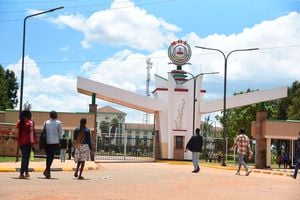
The report by the Auditor-General covering the year ending June 2022, highlights significant lapses in oversight, weak financial systems and misappropriation of public funds.
An audit report has revealed deep-rooted financial mismanagement, waste and corruption in public universities that may have led to the loss of over Sh14 billion.
The report by Auditor-General Nancy Gathungu covering the year ending June 2022, highlights significant lapses in oversight, weak financial systems and misappropriation of public funds.
Weak systems and a failure to account for substantial sums of money were widespread, according to Ms Gathungu, who noted that “failure by the entities to fully support payments casts doubt on the authenticity of the reported expenditures”.
Other avenues leading to loss of public funds according to Ms Gathungu include irregular payments and expenditures due to weak internal controls and governance. Dubious supplier contracts and procurements exceeding approved budgets were also noted. Officials in the universities have also been receiving payments without supporting documents.
Leading the list of offenders is Maasai Mara University in Narok County with questionable expenditures surpassing Sh3 billion, followed closely by Moi University.
Maasai Mara University’s financial irregularities include Sh641 million paid to suppliers with discrepancies of Sh287 million between financial statements and bank accounts. An additional Sh113 million went unaccounted for, with dubious expenses such as Sh6 million spent on foreign trips for university council members to Dubai and Zanzibar and Sh55 million on goods and services.
“Evidence of travel, by way of invitation letters, copies of air tickets, boarding passes and passports, activities and other details of the foreign trips to Dubai and Zanzibar were not provided for audit,” reads the report.
Moi University could not account for over Sh1.6 billion according to the audit report.
Notable expenditure include Sh34.4 million in legal fees to unnamed lawyers and Sh46.8 million for field courses, with Ms Gathungu noting that the expenditure “was not supported by travel documents”.
“Casual staff were paid Sh262.1 million. However, the expenditure was not planned and budgeted for. Also, no individual bank account details or any details of the casuals, including records on statutory deductions, was provided for audit, meaning the money may have been embezzled,” stated part of the report.
Egerton University in Nakuru County was put on the spot over an unauthorised bank overdraft of over Sh239 million “without authority of the National Treasury against the law”.
Staff salary deductions totalling Sh6 million were also unremitted, leading to financial strain and repeated employee strikes last year.
Other universities on the spot include the Technical University of Kenya with questionable expenditure of Sh1 billion, Kabianga University (Sh877 million) and Kenyatta University (Sh835 million).
According to the audit, at least nine universities collectively disbursed Sh559 million in irregular allowances, overpayments, penalties and avoidable legal costs. Kenyatta University, for instance, spent Sh430 million on its closed Kigali campus.
Jomo Kenyatta University of Agriculture and Technology made payments of over Sh3.3 million for an undelivered dental chair and as a result, the university lost money. The university management also paid more than Sh3 million in irregular acting and special duty allowances.










